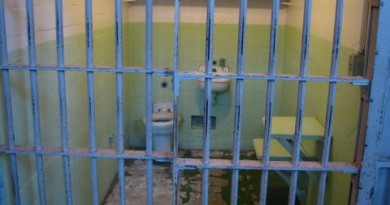Afraid to hope…
 The most recent news out of Israel is very encouraging. On Sunday a cease-fire went into effect between Israel and all of the major Palestinian terror organizations; the cease-fire has even has the support of exiled Hamas leader Khaled Meshal, which is crucial in making it stick. Meshal first said he would give the ceasefire six months to make progress toward a Palestinian state within the 1967 borders, and then said six months was not a firm deadline, he might even give it eight or ten months. But it is quite significant that he was willing to say he’d accept a state within the ’67 borders. As reported in Ynet the Israeli military has real reservations about the ceasefire — they are concerned it will simply advance the interests of the Palestinians.
The most recent news out of Israel is very encouraging. On Sunday a cease-fire went into effect between Israel and all of the major Palestinian terror organizations; the cease-fire has even has the support of exiled Hamas leader Khaled Meshal, which is crucial in making it stick. Meshal first said he would give the ceasefire six months to make progress toward a Palestinian state within the 1967 borders, and then said six months was not a firm deadline, he might even give it eight or ten months. But it is quite significant that he was willing to say he’d accept a state within the ’67 borders. As reported in Ynet the Israeli military has real reservations about the ceasefire — they are concerned it will simply advance the interests of the Palestinians.
But more than just a ceasefire, yesterday (Monday, November 27) Israeli Prime Minister Ehud Olmert gave a major policy speech (click here to read excerpts) in which he indicated a willingness to meet with Palestinian Prime Minister Mahmoud Abbas to discuss a real and lasting peace. Olmert said "If a new Palestinian government is established — a government which will be committed to the principles of the Quartet, implement the (U.S.-drafted) roadmap and bring about the release of Gilad Shalit, I will invite Abu-Mazen (Palestinian President Mahmoud Abbas) to meet with me immediately, in order to conduct a real, open, genuine and serious dialogue between us."
The BBC presents an interesting set of reactions to Olmert’s speech. A sample follows:
The left-leaning Haaretz: After despairing and losing his way in the wake of the Lebanon war, Prime Minister Ehud Olmert yesterday presented a clear political strategy. The speech puts the resolution of the conflict with the Palestinians back at the top of Israel’s national agenda. Olmert deserves praise for his decision to embark on a political initiative.
The right-leaning Jerusalem Post: Prime Minister Olmert’s speech at the grave of David Ben-Gurion in Sde Boker represents the ultimate burial of Israeli determination and the military and diplomatic triumph of Hamas… And so our cities are doomed and our citizens condemned to keep living under the growing threat of rocket fire from both the north and the south, until we recover our senses and return to our neglected culture of military resolve.
Reaction in the blogosphere is mostly pessimistic. Maybe the right wing just has the more prolific bloggers. Captain Ed says: "Whatever Olmert’s motivation, he hasn’t been rewarded with any movement from his enemies. Given their history, we can expect the Palestinians not to miss this opportunity to miss another opportunity." Israel Matzav asks "What is Olmert smoking and where can I get some?" On the other hand, Faithful Progressive asks "Is Israel moving away from its version of neo-conservativism–what I call militaristic idealism–the fantasy that military strength has no limits? Olmert’s speech makes one just a bit hopeful…"
Myself, I’m afraid to feel optimistic. I desperately want to feel optimistic. I’m speaking and sharing a prayer for peace at an interfaith gathering in Defiance, Ohio tonight; how can I go speak about peace and still be pessimisstic? But I remember back to August/September 2000 — when I was living in Israel. When we arrived in July 2000 peace was in the air, everyone could practically taste it. Clinton had been meeting with Arafat and Barak, it looked like a deal was imminent — and then thoses hopes were crushed when the negotiations fell apart and the Palestinians responded with the 2nd Intifada. On July 26, 2000, we heard the talks had fallen apart; the director of Ulpan Akiva where I had been studying said that for the first time he is not optimistic about the prospects for peace. He felt the failure of the talks was something "chasuv m’od," very important, with serious consequences." At the time it was depressing to hear a knowledgable Israeli like him, who was optimistic through all sort of other problems, through the Lebanon war, the Intifada, etc. had become pessimisstic. And of course he was very right. Ever since then, it’s been hard for me to feel much optimism.
Still, at the end of the day, a ceasefire is better than continued fighting. Lasting peace will not come militarily — it will only come through negotiation. So as tired as we may be of the merry-go-round, there really is little choice but to do what Olmert is doing, to reach out a hand in peace, to hope that this time the Palestinians are going to be able to get their act together, to pray that both sides will have the courage to take the difficult steps and concessions needed for both peoples to be able to get on with their lives. Given that in seven months we’ll be living there I really really really hope that it works out — yet I’ve seen so many other false starts and dead ends that it’s hard to believe that this time will be different. May God prove my fears wrong.
Reb Barry

